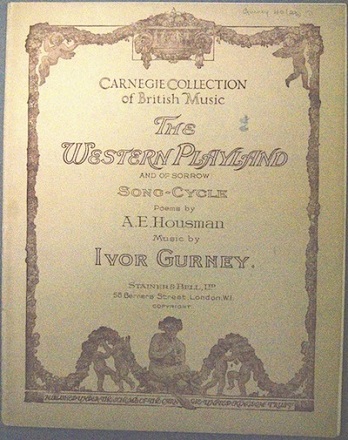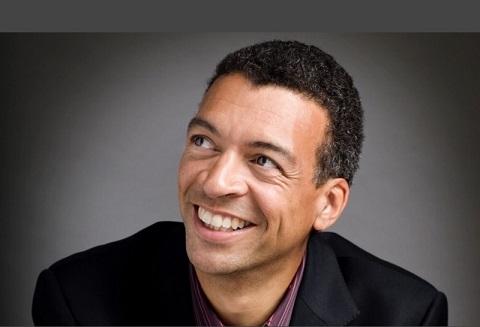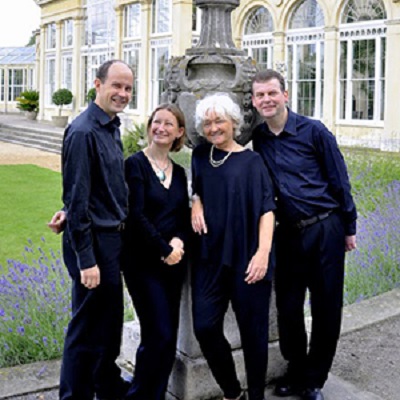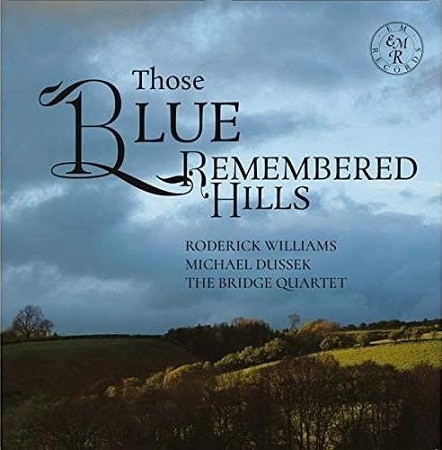Whether singing to the birds of the Warwickshire countryside from his rural
garden, participating in Wigmore Hall’s ground-breaking
live lunchtime recital series, or
popping up as Papageno - reliving memories of his 2017 Covent Garden performances by
self-accompanying ‘Ein Mädchen oder Weibchen’ with a percussion orchestra
of ‘tuned’ glasses and forks - Williams doesn’t seem to have had a ‘quiet’
lockdown in any sense of the word.
Another thing that seems to have been ringing regularly in my ears of late
is music from what is often termed the ‘English Musical Renaissance’, those
late Victorian and Edwardian years when English composers sought, by
drawing on folksong and music from the Tudor and Stuart period, to
establish a contemporary national musical idiom, distinct from but equal to
European traditions and styles. Williams has been a strong presence in this
regard too: alongside performances of Butterworth and Vaughan Williams,
Williams’ and pianist Susie Allan’s interpretations of
Sir Arthur Sullivan’s song-cycles
A Shropshire Lad
and Maud was released by Somm Recordings in May, and now we have
the opportunity to hear Williams return to Housman as set by Ivor Gurney,
alongside the music of Herbert Howells, on this splendid Em Records
release, Those Blue Remembered Hills.

The works presented on Those Blue Remembered Hills were all
composed between 1914 and 1925, and several are world premiere recordings.
This disc opens with Gurney’s The Western Playland (and of Sorrow), a song-cycle comprising eight settings of poems from Housman’s A Shropshire Lad, in which Williams is joined by pianist
Michael Dussek and the Bridge String Quartet. These instrumentalists also
performed, with tenor Charles Daniels, on an earlier Em Records disc,
Heracleitus, which offered another Gurney setting of Housman, Ludlow and Teme,
composed in the same year. At the Royal College of Music, Gurney had
studied both German lieder and French mélodie traditions, but both of these
Housman song-cycles are evidently influenced by Vaughan Williams’ On Wenlock Edge (1909) which Gurney heard in 1919. They were
published as part of the Carnegie Collection of British Music, Ludlow and Teme in 1923 and The Western Playland in 1926.
Gurney had revised both scores while he was a patient at the City of London
Mental Hospital in Dartford, Kent, where he remained until his death in
1937 at the age of 47. The cycle is presented here in a new edition by
Philip Lancaster, who explains (in one of several of the liner book’s
illuminating articles, and
elsewhere) that Gurney’s revisions were quite substantial - ‘textures were added and
reworked, the scoring often wholly altered (one song originally scored
largely for strings was in revision accompanied largely by piano);
harmonies became more diffuse, in Gurney’s impressionistic vein; and the
songs in parts substantially redrafted’ - and sometimes very problematic
(in one case, leading Lancaster to return largely to the original 1920
version). Reflecting on the title, Lancaster speculates that title of The Western Playland alludes to both the Western Front and to
Gurney’s home county of Gloucestershire, while ‘and of Sorrow’ which was
added in 1925 may be inspired by A Shropshire Lad poem, not set
here:
‘In my own shire, if I was sad,
Homely comforters I had:
The earth, because my heart mas sore,
Sorrowed for the son she bore;
And standing hills, long to remain,
Shared their short-lived comrade’s pain.’ (XLI)
As one would expect, Gurney’s musical responses to Housman’s poems are
sensitive and intensely lyrical. Listening to the cycle for the first time,
I heard a Brahmsian touch in the melodies, but I was struck by the
flexibility of Gurney’s forms and melodies as he shapes each song and
phrase precisely to the sounds and sense of the poetic text, and by the
surprisingly unpredictable harmonic twists and heightenings. The
instrumental accompaniments are no less diverse in timbres, texture and
colour, and they serve as sonic landscapes which support the verbal meaning
and emotion. The songs present considerable technical challenges for all
the performers. The instrumentalists must balance ever-changing textures,
while the singer must negotiate sometimes angular melodies which rove
through restless rhythmic shapes and wide-ranging tessituras. The smooth
legato that Williams sustains, seemingly effortlessly and always
articulating the texts with precision and finely judged emphasis, is
notable.
 Roderick Williams
Roderick Williams
‘Reveille’ is a stirring dawn cry, the first three stanzas opening with
exhortations to “Wake”, “Wake”, “Up, lad, up, ’tis late for lying”: time
passes, each moment must be lived to the fullest. But, ‘reveille’ does not
just infer sunrise, it is also the word used to describe the bugle-call
that wakes the military, and we hear the beat of soldiers’ drums in the
firm stamp of the piano bass and cello. Williams brilliantly unites lyrical
vocalism with declamatory briskness, and echoes between instruments and the
voice conjure energy. Though the central section is more dreamy, with
thoughts of lands untrod and beckoning hovering softly in the upper
strings, up and onwards it must be. Yet, the quietude of the postlude and
the poignancy of the viola’s ‘last word’ remind us, “There’s be time enough
to sleep” - as Gurney himself confirmed in his own eloquent song to that
‘eternal rest’.
The theme of transience is developed in ‘Loveliest of Trees’ in which the
seventh-based harmony of the opening and impressionistic progressions
create a fleeting, vulnerable quality. There is such delicate melancholy in
the falling motif - a blossom floating gently to the ground - which opens
the piano introduction and vocal line, and which the strings, generally
restrained throughout, develop in the eloquent postlude. This is the sort
of song, and singing, which warms the heart even as it brings hot tears to
one’s eyes. Indeed, “With rue my heart is laden” sings the poet-speaker
after the strings’ tender introduction to the more folk-like ‘Golden
Friends’. Williams’ often unaccompanied vocal line is wonderfully light and
even, threatening at times, it seems, to disappear but softly sustaining
its recollections of “lightfoot boys” and “rose-lipt girls … sleeping in
fields where roses fade”, until a whispered postlude unfurls sweetly into
silence.
Gurney was a keen sportsman as a schoolboy, and football and cricket
momentarily keep grief at bay, sustaining a lust for life in the brief
‘Twice a Week’. Williams’ baritone may be strong and resolute but the
singer’s sentiments are belied by the brusqueness of the gruff, dissonant
strings and the rhythmic instability of the song (which Williams negotiates
with pinpoint accuracy), especially in the final stanza where the
thundering syncopation in the piano bass, mis-accented text-setting and
dense string discords seem to disdainfully sneer. ‘The Aspens’ is folk-like
rumination on eternal nature’s indifference to man’s transience, seen
through the eyes of a widower who predeceases his second wife, thereby
perpetuating the cycle of love and loss. Williams’ unaccompanied vocal
entries are sweet and sure, and the long phrases - the time-signature
ceaselessly changing - extend with lyrical eloquence, accompanied
alternately by strings and piano, the instruments coming together when the
voice is silent. Each time the singer notes the watching aspen, the vocal
line rises to a peak and then falls an octave interval, and the smooth
evenness with which Williams’ shapes this expressive gesture is deeply
moving.
 Michael Dussek.
Michael Dussek.
Gurney eschews the invitation in ‘Is my team ploughing’ to vocally
distinguish the ballad’s speakers preferring instead to oppose the text and
accompaniment to underline the song’s poignancy. For example, the questions
from the man who lies in the earth, “Is my team ploughing”, “Is football
playing … Now that I stand up no more?” are answered by the relentless
jigging, jangling quavers in the piano and strings which cruelly tease with
their undeniable presence and vigour. Tension builds as the harmonies and
textures complicate, but “Is my girl happy” interrupts: a pianissimo
dynamic, a descending vocal phrase and the commencement of an ominous
syncopated low octave pedal in cello and piano bass lead to a solo parlando question, sung with quiet but heart-wrenching directness
by Williams, “And has she tired of weeping/ As she lies down at eve?” The
strings’ hushed answer ‘replies’ powerfully and plaintively. This is a
tremendous unity of lyricism and drama.
However, The Western Playground ends in more joyful fashion, with
‘March’, a setting of the longest poem of the eight, ‘The sun at noon to
higher air’. The piano’s light arpeggio triplets, symmetrically patterned,
and the strings’ concordant sweetness conjure youthfulness and optimism,
while the constant lilt of two-against-three creates a naturalism and
freedom that is perfectly embodied by the relaxed warmth of Williams’ baritone.
There are pauses for instrumental reflection between the stanzas, and a
more ambiguous mood marks the fourth stanza’s mirage-like, symbolist vision
of farm girls resting in the palms’ shadows beside the pond’s and hedge’s
“waving silver-tufted” wands. But, with the firm assertion that “lovers
should be loved again”, Gurney closes not with loss and longing but with
life and love. The lingering postlude at first seems to question such
certainty, but eventually the piano’s dark reverberations, the high silvery
violins and the aspiring ascents of cello and viola dissolve into stillness
and peace.
If I have spent a long time describing The Western Playground it
is because Gurney’s cycle, and even more so this brilliant performance by
Williams, Dussek and the Bridge Quartet, make this disc an absolute
must-have, not just for Gurney aficionados but for all lovers of English
song, indeed all song. But, Those Blue Remembered Hills
offers much more too.
There are four songs by Herbert Howells, including ‘There was a Maiden’ and
‘Girl’s Song’ from Fours Songs Op.22 (1916). In the first,
Williams seems to inject a tint of wisdom into his baritonal warmth - a
note of maturity to balance the shimmering melancholy of the piano’s
oscillating patterns. Here, the baritone’s verbal pointings add much to the
simple strophic form: “The cold wind blows across the lea”,
sending a shiver through one’s spine, while the description of the maiden,
“pale, so pale, with never a rose”, makes one fear for the
vulnerable lass. ‘Girl’s Song’, brimming with desire and visceral feeling,
may last less than 90 seconds, but Williams and Dussek offer a masterclass
in musical articulation and expression. Howell’s setting of a text by
Northumbrian poet Wilfrid Gibson, ‘The Mugger’s Song’, is an unpretentious,
boisterous rural character-study, precisely drawn here; best of all is the
compelling directness and simplicity of ‘King David’, with its ‘antique’
modal and pentatonic tints. Both Williams and Dussek rise to tremendous
heights of eloquent expression.
 The Bridge Quartet
The Bridge Quartet
There are further songs by Gurney too, the ballad ‘Edward, Edward’ - a
setting from the Reliques of Thomas Percy, in which Williams’ has
a good stab at Scots brogue - and one of Gurney’s best-known songs, ‘By a
Bierside’ (a song which was orchestrated by Howells), which Gurney’s Collected Letters (ed. R.K.R. Thornton) reveal ‘came to birth in a
disused Trench Mortar emplacement’ and which brings the disc to a close.
Williams’ demonstrates that his wistful head voice, bold middle range, and
probing deep bass-like resonance are equally affecting. I could literally
feel the thunderous shine of Williams’ proclamation of John Masefield’s
final words, “It is most grand to die”, pulse in my heart, before the
tranquil repetition “so grand” quietened the passion. Heracleitus
had included an Adagio for string quar1tet played by the Bridge
Quartet, which is an earlier version of the D Minor String Quartet heard in
full on this disc - a world premiere recording.
Why is it that these English poets and composers - Georgians and Edwardians -
seem to speak so strongly to us still? I don’t think that it is simply that
they console, or feed, a nostalgia for an Edwardian twilight, more that
there are times, in any age and place, when we long for what we imagine was
a simpler age.
In a letter to his friend Marion Scott (musicologist, poet,
composer, violinist and more) dated December 1916, Gurney reflected on life
in the trenches in France: ‘After all, my friend, it is better to live a
grey life in mud and danger, so long as one uses it - as I trust I am now
doing - as a means to an end. Someday all this experience may be
crystallized and glorified in me; and men shall learn by chance fragments in
a string quartett [sic] or symphony, what thoughts haunted the minds of men
who watched the darkness grimly in desolate places.’ This recording confirms that Gurney did indeed crystallise and glorify those experiences in words and music.
Before listening to this disc, I could not imagine anyone who could better capture the poignancy of that
suffering, and the beauty which rises from it, and transcends it, than Roderick
Williams. Having listened to Those Blue Remembered Hills, I do not
think that Williams has done anything finer.
Claire Seymour




